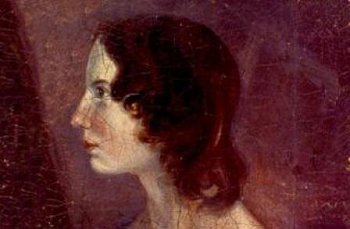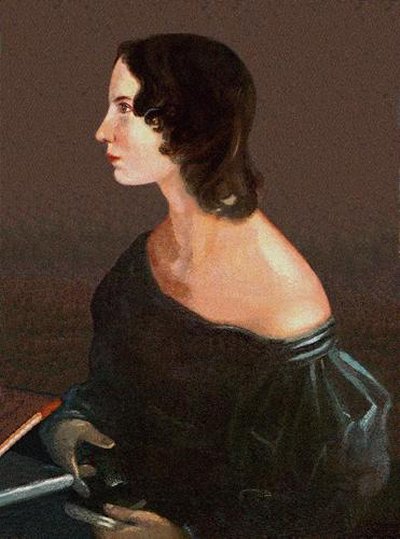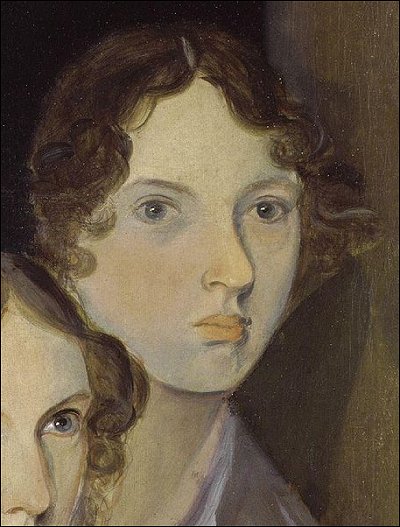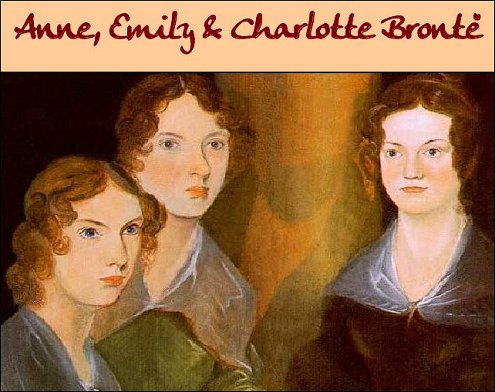Fleurs du Mal Magazine


Or see the index

Emily Bronte
(1818-1848)
No Coward Soul Is Mine
No coward soul is mine,
No trembler in the world’s storm-troubled sphere:
I see Heaven’s glories shine,
And faith shines equal, arming me from fear.
O God within my breast,
Almighty, ever-present Deity!
Life–that in me has rest,
As I–undying Life–have Power in Thee!
Vain are the thousand creeds
That move men’s hearts: unutterably vain;
Worthless as withered weeds,
Or idlest froth amid the boundless main,
To waken doubt in one
Holding so fast by thine infinity;
So surely anchored on
The steadfast rock of immortality.
With wide-embracing love
Thy spirit animates eternal years,
Pervades and broods above,
Changes, sustains, dissolves, creates, and rears.
Though earth and man were gone,
And suns and universes ceased to be,
And Thou wert left alone,
Every existence would exist in Thee.
There is not room for Death,
Nor atom that his might could render void:
Thou–Thou art Being and Breath,
And what Thou art may never be destroyed.
Emily Jane Brontë poetry
(No Coward Soul Is Mine was her last poem)
fleursdumal.nl magazine
More in: Anne, Emily & Charlotte Brontë, Archive A-B, Brontë, Anne, Emily & Charlotte

Emily Brontë
(1818-1848)
The Night-Wind
In summer’s mellow midnight,
A cloudless moon shone through
Our open parlour window
And rosetrees wet with dew.
I sat in silent musing,
The soft wind waved my hair:
It told me Heaven was glorious.
And sleeping Earth was fair.
I needed not its breathing
To bring such thoughts to me,
But still it whispered lowly,
“How dark the woods will be!
“The thick leaves in my murmur
Are rustling like a dream,
And all their myriad voices
Instinct with spirit seem.”
I said, “Go, gentle singer,
Thy wooing voice is kind,
But do not think its music
Has power to reach my mind.
“Play with the scented flower,
The young tree’s supple bough,
And leave my human feelings
In their own course to flow.”
The wanderer would not leave me;
Its kiss grew warmer still –
“O come,” it sighed so sweetly,
“I’ll win thee ‘gainst thy will.
“Have we not been from childhood friends?
Have I not loved thee long?
As long as thou hast loved the night
Whose silence wakes my song.
“And when thy heart is laid at rest
Beneath the church-yard stone
I shall have time enough to mourn
And thou to be alone.”
1840
Emily Brontë
De nachtwind
In ‘t milde zomer-nachtuur
Scheen ‘t maanlicht helderblauw
Door de openstaande tuindeur
En rozenboom vol dauw.
Ik zat in rust te mijmeren,
Mij roerde zacht de wind:
Hij vond de Hemel roemrijk,
d’ Aard’, slapend, welgezind.
Zijn adem kon ik missen
Voor zo ‘n gedachtenlijn,
Maar toch sprak hij weer zachtjes,
“Het bos zal donker zijn!
“Het loof ritselt als schimmen
Door mijn geruis geraakt,
En al hun stemmen schijnen
Door geesten wijs gemaakt.”
Ik zei, “Ga, goede zanger,
Al klinkt je vlei-lied zoet,
Meen niet dat jouw nocturne
Mijn denken wankelen doet.
“Bespeel geurende bloemen,
Raak jonge twijgen aan,
Maar laat mijn mens-gevoelens
Hun eigen weg inslaan.”
De zwerver wou niet heengaan;
Zijn kus nam toe in gloed –
“O kom,” zuchtte hij zachtjes,
“Ik win je, wat je ook doet.
“Was jij van jongsaf niet mijn vriend?
Mind’ ik je niet allang?
Zo lang je al dol bent op de nacht
Wekt stilte daar mijn zang.
“En als op ‘t kerkhof in je graf
Je hart is neergevleid
Heb ik veel tijd voor rouwbeklag
En jij voor eenzaamheid.”
Vertaling Cornelis W. Schoneveld
Uit: Bestorm mijn hart, de beste Engelse gedichten uit de 16e-19e eeuw gekozen en vertaald door Cornelis W. Schoneveld, tweetalige editie. Rainbow Essentials no. 55, Uitgeverij Maarten Muntinga, Amsterdam, 2008, 296 pp, € 9,95 ISBN: 9789041740588
fleursdumal.nl magazine
More in: Anne, Emily & Charlotte Brontë, Archive A-B, Brontë, Brontë, Anne, Emily & Charlotte
.jpg)
Anne Brontë
(1820-1849)
Vanitas Vanitatum,
Omnia Vanitas
In all we do, and hear, and see,
Is restless Toil and Vanity.
While yet the rolling earth abides,
Men come and go like ocean tides;
And ere one generation dies,
Another in its place shall rise;
THAT, sinking soon into the grave,
Others succeed, like wave on wave;
And as they rise, they pass away.
The sun arises every day,
And hastening onward to the West,
He nightly sinks, but not to rest:
Returning to the eastern skies,
Again to light us, he must rise.
And still the restless wind comes forth,
Now blowing keenly from the North;
Now from the South, the East, the West,
For ever changing, ne’er at rest.
The fountains, gushing from the hills,
Supply the ever-running rills;
The thirsty rivers drink their store,
And bear it rolling to the shore,
But still the ocean craves for more.
‘Tis endless labour everywhere!
Sound cannot satisfy the ear,
Light cannot fill the craving eye,
Nor riches half our wants supply,
Pleasure but doubles future pain,
And joy brings sorrow in her train;
Laughter is mad, and reckless mirth–
What does she in this weary earth?
Should Wealth, or Fame, our Life employ,
Death comes, our labour to destroy;
To snatch the untasted cup away,
For which we toiled so many a day.
What, then, remains for wretched man?
To use life’s comforts while he can,
Enjoy the blessings Heaven bestows,
Assist his friends, forgive his foes;
Trust God, and keep His statutes still,
Upright and firm, through good and ill;
Thankful for all that God has given,
Fixing his firmest hopes on Heaven;
Knowing that earthly joys decay,
But hoping through the darkest day.
Memory
Brightly the sun of summer shone
Green fields and waving woods upon,
And soft winds wandered by;
Above, a sky of purest blue,
Around, bright flowers of loveliest hue,
Allured the gazer’s eye.
But what were all these charms to me,
When one sweet breath of memory
Came gently wafting by?
I closed my eyes against the day,
And called my willing soul away,
From earth, and air, and sky;
That I might simply fancy there
One little flower–a primrose fair,
Just opening into sight;
As in the days of infancy,
An opening primrose seemed to me
A source of strange delight.
Sweet Memory! ever smile on me;
Nature’s chief beauties spring from thee;
Oh, still thy tribute bring
Still make the golden crocus shine
Among the flowers the most divine,
The glory of the spring.
Still in the wallflower’s fragrance dwell;
And hover round the slight bluebell,
My childhood’s darling flower.
Smile on the little daisy still,
The buttercup’s bright goblet fill
With all thy former power.
For ever hang thy dreamy spell
Round mountain star and heather bell,
And do not pass away
From sparkling frost, or wreathed snow,
And whisper when the wild winds blow,
Or rippling waters play.
Is childhood, then, so all divine?
Or Memory, is the glory thine,
That haloes thus the past?
Not ALL divine; its pangs of grief
(Although, perchance, their stay be brief)
Are bitter while they last.
Nor is the glory all thine own,
For on our earliest joys alone
That holy light is cast.
With such a ray, no spell of thine
Can make our later pleasures shine,
Though long ago they passed.

Anne Brontë poetry
fleursdumal magazine
More in: Anne, Emily & Charlotte Brontë, Brontë, Anne, Emily & Charlotte
.jpg)
A n n e B r o n t ë
(1820-1849)
Past Days
‘Tis strange to think there WAS a time
When mirth was not an empty name,
When laughter really cheered the heart,
And frequent smiles unbidden came,
And tears of grief would only flow
In sympathy for others’ woe;
When speech expressed the inward thought,
And heart to kindred heart was bare,
And summer days were far too short
For all the pleasures crowded there;
And silence, solitude, and rest,
Now welcome to the weary breast–
Were all unprized, uncourted then–
And all the joy one spirit showed,
The other deeply felt again;
And friendship like a river flowed,
Constant and strong its silent course,
For nought withstood its gentle force:
When night, the holy time of peace,
Was dreaded as the parting hour;
When speech and mirth at once must cease,
And silence must resume her power;
Though ever free from pains and woes,
She only brought us calm repose.
And when the blessed dawn again
Brought daylight to the blushing skies,
We woke, and not RELUCTANT then,
To joyless LABOUR did we rise;
But full of hope, and glad and gay,
We welcomed the returning day.
![]()
Acton Bell (Anne Brontë) poetry
fleursdumal.nl magazine
More in: Anne, Emily & Charlotte Brontë, Archive A-B, Brontë, Anne, Emily & Charlotte
.jpg)
Anne Brontë
(1820-1849)
Stanzas
Oh, weep not, love! each tear that springs
In those dear eyes of thine,
To me a keener suffering brings
Than if they flowed from mine.
And do not droop! however drear
The fate awaiting thee;
For MY sake combat pain and care,
And cherish life for me!
I do not fear thy love will fail;
Thy faith is true, I know;
But, oh, my love! thy strength is frail
For such a life of woe.
Were ‘t not for this, I well could trace
(Though banished long from thee)
Life’s rugged path, and boldly face
The storms that threaten me.
Fear not for me–I’ve steeled my mind
Sorrow and strife to greet;
Joy with my love I leave behind,
Care with my friends I meet.
A mother’s sad reproachful eye,
A father’s scowling brow–
But he may frown and she may sigh:
I will not break my vow!
I love my mother, I revere
My sire, but fear not me–
Believe that Death alone can tear
This faithful heart from thee.
If this be all
O God! if this indeed be all
That Life can show to me;
If on my aching brow may fall
No freshening dew from Thee;
If with no brighter light than this
The lamp of hope may glow,
And I may only dream of bliss,
And wake to weary woe;
If friendship’s solace must decay,
When other joys are gone,
And love must keep so far away,
While I go wandering on,–
Wandering and toiling without gain,
The slave of others’ will,
With constant care, and frequent pain,
Despised, forgotten still;
Grieving to look on vice and sin,
Yet powerless to quell
The silent current from within,
The outward torrent’s swell
While all the good I would impart,
The feelings I would share,
Are driven backward to my heart,
And turned to wormwood there;
If clouds must EVER keep from sight
The glories of the Sun,
And I must suffer Winter’s blight,
Ere Summer is begun;
If Life must be so full of care,
Then call me soon to thee;
Or give me strength enough to bear
My load of misery.
Home
How brightly glistening in the sun
The woodland ivy plays!
While yonder beeches from their barks
Reflect his silver rays.
That sun surveys a lovely scene
From softly smiling skies;
And wildly through unnumbered trees
The wind of winter sighs:
Now loud, it thunders o’er my head,
And now in distance dies.
But give me back my barren hills
Where colder breezes rise;
Where scarce the scattered, stunted trees
Can yield an answering swell,
But where a wilderness of heath
Returns the sound as well.
For yonder garden, fair and wide,
With groves of evergreen,
Long winding walks, and borders trim,
And velvet lawns between;
Restore to me that little spot,
With gray walls compassed round,
Where knotted grass neglected lies,
And weeds usurp the ground.
Though all around this mansion high
Invites the foot to roam,
And though its halls are fair within–
Oh, give me back my HOME!

Anne Brontë poetry
fleursdumal.nl magazine
More in: Anne, Emily & Charlotte Brontë, Brontë, Anne, Emily & Charlotte
.jpg)
Charlotte Brontë
(1816–1855)
Mementos
Arranging long-locked drawers and shelves
Of cabinets, shut up for years,
What a strange task we’ve set ourselves!
How still the lonely room appears!
How strange this mass of ancient treasures,
Mementos of past pains and pleasures;
These volumes, clasped with costly stone,
With print all faded, gilding gone;
These fans of leaves from Indian trees–
These crimson shells, from Indian seas–
These tiny portraits, set in rings–
Once, doubtless, deemed such precious things;
Keepsakes bestowed by Love on Faith,
And worn till the receiver’s death,
Now stored with cameos, china, shells,
In this old closet’s dusty cells.
I scarcely think, for ten long years,
A hand has touched these relics old;
And, coating each, slow-formed, appears
The growth of green and antique mould.
All in this house is mossing over;
All is unused, and dim, and damp;
Nor light, nor warmth, the rooms discover–
Bereft for years of fire and lamp.
The sun, sometimes in summer, enters
The casements, with reviving ray;
But the long rains of many winters
Moulder the very walls away.
And outside all is ivy, clinging
To chimney, lattice, gable grey;
Scarcely one little red rose springing
Through the green moss can force its way.
Unscared, the daw and starling nestle,
Where the tall turret rises high,
And winds alone come near to rustle
The thick leaves where their cradles lie,
I sometimes think, when late at even
I climb the stair reluctantly,
Some shape that should be well in heaven,
Or ill elsewhere, will pass by me.
I fear to see the very faces,
Familiar thirty years ago,
Even in the old accustomed places
Which look so cold and gloomy now,
I’ve come, to close the window, hither,
At twilight, when the sun was down,
And Fear my very soul would wither,
Lest something should be dimly shown,
Too much the buried form resembling,
Of her who once was mistress here;
Lest doubtful shade, or moonbeam trembling,
Might take her aspect, once so dear.
Hers was this chamber; in her time
It seemed to me a pleasant room,
For then no cloud of grief or crime
Had cursed it with a settled gloom;
I had not seen death’s image laid
In shroud and sheet, on yonder bed.
Before she married, she was blest–
Blest in her youth, blest in her worth;
Her mind was calm, its sunny rest
Shone in her eyes more clear than mirth.
And when attired in rich array,
Light, lustrous hair about her brow,
She yonder sat, a kind of day
Lit up what seems so gloomy now.
These grim oak walls even then were grim;
That old carved chair was then antique;
But what around looked dusk and dim
Served as a foil to her fresh cheek;
Her neck and arms, of hue so fair,
Eyes of unclouded, smiling light;
Her soft, and curled, and floating hair,
Gems and attire, as rainbow bright.
Reclined in yonder deep recess,
Ofttimes she would, at evening, lie
Watching the sun; she seemed to bless
With happy glance the glorious sky.
She loved such scenes, and as she gazed,
Her face evinced her spirit’s mood;
Beauty or grandeur ever raised
In her, a deep-felt gratitude.
But of all lovely things, she loved
A cloudless moon, on summer night,
Full oft have I impatience proved
To see how long her still delight
Would find a theme in reverie,
Out on the lawn, or where the trees
Let in the lustre fitfully,
As their boughs parted momently,
To the soft, languid, summer breeze.
Alas! that she should e’er have flung
Those pure, though lonely joys away–
Deceived by false and guileful tongue,
She gave her hand, then suffered wrong;
Oppressed, ill-used, she faded young,
And died of grief by slow decay.
Open that casket-look how bright
Those jewels flash upon the sight;
The brilliants have not lost a ray
Of lustre, since her wedding day.
But see–upon that pearly chain–
How dim lies Time’s discolouring stain!
I’ve seen that by her daughter worn:
For, ere she died, a child was born;–
A child that ne’er its mother knew,
That lone, and almost friendless grew;
For, ever, when its step drew nigh,
Averted was the father’s eye;
And then, a life impure and wild
Made him a stranger to his child:
Absorbed in vice, he little cared
On what she did, or how she fared.
The love withheld she never sought,
She grew uncherished–learnt untaught;
To her the inward life of thought
Full soon was open laid.
I know not if her friendlessness
Did sometimes on her spirit press,
But plaint she never made.
The book-shelves were her darling treasure,
She rarely seemed the time to measure
While she could read alone.
And she too loved the twilight wood
And often, in her mother’s mood,
Away to yonder hill would hie,
Like her, to watch the setting sun,
Or see the stars born, one by one,
Out of the darkening sky.
Nor would she leave that hill till night
Trembled from pole to pole with light;
Even then, upon her homeward way,
Long–long her wandering steps delayed
To quit the sombre forest shade,
Through which her eerie pathway lay.
You ask if she had beauty’s grace?
I know not–but a nobler face
My eyes have seldom seen;
A keen and fine intelligence,
And, better still, the truest sense
Were in her speaking mien.
But bloom or lustre was there none,
Only at moments, fitful shone
An ardour in her eye,
That kindled on her cheek a flush,
Warm as a red sky’s passing blush
And quick with energy.
Her speech, too, was not common speech,
No wish to shine, or aim to teach,
Was in her words displayed:
She still began with quiet sense,
But oft the force of eloquence
Came to her lips in aid;
Language and voice unconscious changed,
And thoughts, in other words arranged,
Her fervid soul transfused
Into the hearts of those who heard,
And transient strength and ardour stirred,
In minds to strength unused,
Yet in gay crowd or festal glare,
Grave and retiring was her air;
‘Twas seldom, save with me alone,
That fire of feeling freely shone;
She loved not awe’s nor wonder’s gaze,
Nor even exaggerated praise,
Nor even notice, if too keen
The curious gazer searched her mien.
Nature’s own green expanse revealed
The world, the pleasures, she could prize;
On free hill-side, in sunny field,
In quiet spots by woods concealed,
Grew wild and fresh her chosen joys,
Yet Nature’s feelings deeply lay
In that endowed and youthful frame;
Shrined in her heart and hid from day,
They burned unseen with silent flame.
In youth’s first search for mental light,
She lived but to reflect and learn,
But soon her mind’s maturer might
For stronger task did pant and yearn;
And stronger task did fate assign,
Task that a giant’s strength might strain;
To suffer long and ne’er repine,
Be calm in frenzy, smile at pain.
Pale with the secret war of feeling,
Sustained with courage, mute, yet high;
The wounds at which she bled, revealing
Only by altered cheek and eye;
She bore in silence–but when passion
Surged in her soul with ceaseless foam,
The storm at last brought desolation,
And drove her exiled from her home.
And silent still, she straight assembled
The wrecks of strength her soul retained;
For though the wasted body trembled,
The unconquered mind, to quail, disdained.
She crossed the sea–now lone she wanders
By Seine’s, or Rhine’s, or Arno’s flow;
Fain would I know if distance renders
Relief or comfort to her woe.
Fain would I know if, henceforth, ever,
These eyes shall read in hers again,
That light of love which faded never,
Though dimmed so long with secret pain.
She will return, but cold and altered,
Like all whose hopes too soon depart;
Like all on whom have beat, unsheltered,
The bitter blasts that blight the heart.
No more shall I behold her lying
Calm on a pillow, smoothed by me;
No more that spirit, worn with sighing,
Will know the rest of infancy.
If still the paths of lore she follow,
‘Twill be with tired and goaded will;
She’ll only toil, the aching hollow,
The joyless blank of life to fill.
And oh! full oft, quite spent and weary,
Her hand will pause, her head decline;
That labour seems so hard and dreary,
On which no ray of hope may shine.
Thus the pale blight of time and sorrow
Will shade with grey her soft, dark hair;
Then comes the day that knows no morrow,
And death succeeds to long despair.
So speaks experience, sage and hoary;
I see it plainly, know it well,
Like one who, having read a story,
Each incident therein can tell.
Touch not that ring; ’twas his, the sire
Of that forsaken child;
And nought his relics can inspire
Save memories, sin-defiled.
I, who sat by his wife’s death-bed,
I, who his daughter loved,
Could almost curse the guilty dead,
For woes the guiltless proved.
And heaven did curse–they found him laid,
When crime for wrath was rife,
Cold–with the suicidal blade
Clutched in his desperate gripe.
‘Twas near that long deserted hut,
Which in the wood decays,
Death’s axe, self-wielded, struck his root,
And lopped his desperate days.
You know the spot, where three black trees,
Lift up their branches fell,
And moaning, ceaseless as the seas,
Still seem, in every passing breeze,
The deed of blood to tell.
They named him mad, and laid his bones
Where holier ashes lie;
Yet doubt not that his spirit groans
In hell’s eternity.
But, lo! night, closing o’er the earth,
Infects our thoughts with gloom;
Come, let us strive to rally mirth
Where glows a clear and tranquil hearth
In some more cheerful room.

Currer Bell (Charlotte Brontë) poetry
fleursdumal.nl magazine
More in: Anne, Emily & Charlotte Brontë, Brontë, Anne, Emily & Charlotte
.jpg)
Emily Jane Brontë
(1818-1848)
S t a r s
Ah! why, because the dazzling sun
Restored our Earth to joy,
Have you departed, every one,
And left a desert sky?
All through the night, your glorious eyes
Were gazing down in mine,
And, with a full heart’s thankful sighs,
I blessed that watch divine.
I was at peace, and drank your beams
As they were life to me;
And revelled in my changeful dreams,
Like petrel on the sea.
Thought followed thought, star followed star,
Through boundless regions, on;
While one sweet influence, near and far,
Thrilled through, and proved us one!
Why did the morning dawn to break
So great, so pure, a spell;
And scorch with fire the tranquil cheek,
Where your cool radiance fell?
Blood-red, he rose, and, arrow-straight,
His fierce beams struck my brow;
The soul of nature sprang, elate,
But mine sank sad and low!
My lids closed down, yet through their veil
I saw him, blazing, still,
And steep in gold the misty dale,
And flash upon the hill.
I turned me to the pillow, then,
To call back night, and see
Your worlds of solemn light, again,
Throb with my heart, and me!
It would not do–the pillow glowed,
And glowed both roof and floor;
And birds sang loudly in the wood,
And fresh winds shook the door;
The curtains waved, the wakened flies
Were murmuring round my room,
Imprisoned there, till I should rise,
And give them leave to roam.
Oh, stars, and dreams, and gentle night;
Oh, night and stars, return!
And hide me from the hostile light
That does not warm, but burn;
That drains the blood of suffering men;
Drinks tears, instead of dew;
Let me sleep through his blinding reign,
And only wake with you!

Emily Brontë poetry
fleursdumal.nl magaziine
More in: Anne, Emily & Charlotte Brontë, Brontë, Anne, Emily & Charlotte

Anne Brontë
(1820-1849)
The Penitent
I mourn with thee, and yet rejoice
That thou shouldst sorrow so;
With angel choirs I join my voice
To bless the sinner’s woe.
Though friends and kindred turn away,
And laugh thy grief to scorn;
I hear the great Redeemer say,
“Blessed are ye that mourn.”
Hold on thy course, nor deem it strange
That earthly cords are riven:
Man may lament the wondrous change,
But “there is joy in heaven!”
A Reminiscence
Yes, thou art gone! and never more
Thy sunny smile shall gladden me;
But I may pass the old church door,
And pace the floor that covers thee,
May stand upon the cold, damp stone,
And think that, frozen, lies below
The lightest heart that I have known,
The kindest I shall ever know.
Yet, though I cannot see thee more,
‘Tis still a comfort to have seen;
And though thy transient life is o’er,
‘Tis sweet to think that thou hast been;
To think a soul so near divine,
Within a form so angel fair,
United to a heart like thine,
Has gladdened once our humble sphere.
Lines composed in a Wood
on a windy Day
My soul is awakened, my spirit is soaring
And carried aloft on the wings of the breeze;
For above and around me the wild wind is roaring,
Arousing to rapture the earth and the seas.
The long withered grass in the sunshine is glancing,
The bare trees are tossing their branches on high;
The dead leaves beneath them are merrily dancing,
The white clouds are scudding across the blue sky
I wish I could see how the ocean is lashing
The foam of its billows to whirlwinds of spray;
I wish I could see how its proud waves are dashing,
And hear the wild roar of their thunder to-day!
The Arbour
I’ll rest me in this sheltered bower,
And look upon the clear blue sky
That smiles upon me through the trees,
Which stand so thick clustering by;
And view their green and glossy leaves,
All glistening in the sunshine fair;
And list the rustling of their boughs,
So softly whispering through the air.
And while my ear drinks in the sound,
My winged soul shall fly away;
Reviewing lone departed years
As one mild, beaming, autumn day;
And soaring on to future scenes,
Like hills and woods, and valleys green,
All basking in the summer’s sun,
But distant still, and dimly seen.
Oh, list! ’tis summer’s very breath
That gently shakes the rustling trees–
But look! the snow is on the ground–
How can I think of scenes like these?
‘Tis but the FROST that clears the air,
And gives the sky that lovely blue;
They’re smiling in a WINTER’S sun,
Those evergreens of sombre hue.
And winter’s chill is on my heart–
How can I dream of future bliss?
How can my spirit soar away,
Confined by such a chain as this?

Acton Bell (Anna Brontë) poetry
fleursdumal.nl magazine
More in: Anne, Emily & Charlotte Brontë, Brontë, Anne, Emily & Charlotte
Thank you for reading Fleurs du Mal - magazine for art & literature